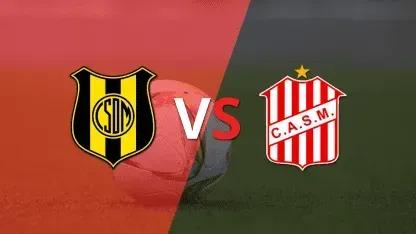A crucial match in the Primera Nacional
The clash between Deportivo Madryn and San Martín de Tucumán in the Primera Nacional reflects the struggle for survival in Argentine football. In this context, the performance of both teams not only defines their immediate future in the competition but also has significant implications for their respective localities, where football represents a central element of identity and social cohesion.
⚽ Current overview
In the last match played, Deportivo Madryn convincingly defeated San Martín de Tucumán 3-0, which is a tough blow for the Tucumán team, currently at the bottom of the table. This defeat not only reflects issues in the team's performance but also calls into question the strategy and leadership of the coaching staff and the club's management. The situation is critical given that the Primera Nacional is a tournament where the pressure to avoid relegation is constant and every match counts.
The lack of positive results can create a domino effect in the club's environment, affecting fan attendance and player morale. Moreover, the San Martín team, with a rich history in Argentine football, faces the challenge of not only reversing its on-field performance but also regaining the trust of its supporters. In terms of statistics, San Martín has exhibited inconsistent performance this season, increasing pressure on its players.
🌍 International comparison
Looking at other international contexts, we can identify how different leagues have managed similar situations. For example, in Spain, teams like Real Betis and Deportivo La Coruña have faced relegation and have successfully recovered through management strategies that include investing in young talents and improving infrastructures. This has allowed not only a sports recovery but also a strengthening of the club's identity in their respective communities.
In England, club management in the English Football League has shown that success at the bottom of the table can depend on administrative stability and a clear long-term vision. Teams like Sunderland have invested in their academies and in attracting local talents, leading to a resurgence in competition. These examples are relevant for San Martín de Tucumán, which could benefit from a thorough review of its policies and administrative strategies.
📈 Social and economic implications
The impact of poor performance in football goes beyond results on the pitch. In the case of San Martín de Tucumán, a series of defeats can translate into economic losses due to decreasing attendance at matches, thereby affecting ticket sales and merchandising revenue. Furthermore, the club's image may be tarnished, which could have long-term consequences for attracting sponsors and securing the necessary investment for improving the squad.
From a social perspective, football acts as a unifying force within the community. Fan disappointment can create a climate of apathy and discontent, which is concerning in a society where sport is a fundamental component of local culture. It is essential that clubs like San Martín focus not only on results but also on strengthening the relationship with their fans, fostering a sense of belonging that transcends victories or defeats.
⚖️ Strategies for recovery
To reverse the current situation, San Martín de Tucumán must consider a series of strategies that have been successfully implemented in other clubs in crisis. First, it is vital to assess the coaching staff and their ability to generate a change in the team’s performance. Strong leadership can be decisive in crisis situations.
Secondly, establishing effective communication with fans is crucial, informing them about the measures being taken to reverse the situation. Transparency can build trust and support during tough times. Additionally, investing in attracting young talent and improving sports facilities can be a long-term strategy that yields positive results.
Finally, the possibility of forming partnerships with other clubs or sports entities to share resources and information could be a valuable tool for tackling the challenges the team currently faces.
In conclusion, the situation of San Martín de Tucumán in the Primera Nacional is complex and demands a multidimensional approach. The key lies in combining effective management, a strong relationship with the community, and implementing sustainable strategies that seek not only immediate results but also ensure a prosperous future for the club. Undoubtedly, the road to recovery will be arduous, but with a clear plan and the collaboration of all involved parties, it is possible to reverse the situation and return San Martín to the path of success.

Comments